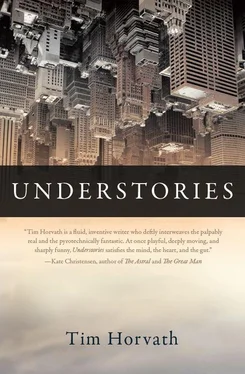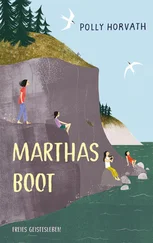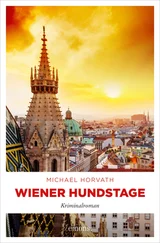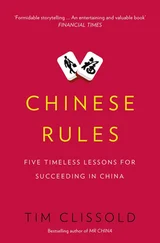As they’d gone on arm in arm by the light of the closed shops, headed back toward their hotel, the windows arranged and decorated to snare attention, lit to magic, he had the sense that he was watching a film slowed down, frame by frame, and a further epiphany came on, something that couldn’t be confused with sexual desire as easily as a woman’s swaying. It was something like: Every city desired to be Palamoa, to be at once frame and light and motion. Palamoa itself, possessing all of these, was yet unsatisfied, for it, in turn, desired to be a single film that encompassed all, an ideal one that ran through all projectors at once, infinite, one that you would clip at intervals only so that you could splice more, newer footage into the old. He felt that if he could’ve only expressed this he would’ve endeared himself to Inez forever.

Maybe he should’ve called first, was his thought as he rapped Gunther’s knocker. Gunther opened the door enrobed, like someone just awakened. For a bachelor, he lived well. His unshaven face and the extra pounds, Wes supposed, would not be liabilities in the dark. Gunther always had some blue-haired chick on his arm, some girl who’d quiver, electrified by his “opiate of the masses” talk. Usually the relationship lasted till the girl wanted him to move away from Palamoa, and Gunther steadfastly refused, citing Socrates-like noblesse oblige.
“Shouldn’t you be at work?” Gunther asked. Wes caught alcohol on his breath mingled with something from the kitchen that had once been in the sea.
He explained it to Gunther — what he’d seen, how he’d killed the film.
“You’re sure it was her?”
“Positive. I doubted it at first. I made sure.”
“A telltale birthmark? A chipped tooth?”
“It was her.”
“Come in.”
Within, sure enough, was the girl du jour, her hair not blue but with the ripped T-shirt and spiderweb stockings and the Che button and one with a red slash through a film icon.
“My oldest pal,” Gunther introduced him, and then, shaking his head as if he couldn’t believe it, “a pro jectioneer .”
“Hey, man, I don’t judge,” said the girl, whose name turned out to be Aurora. “You’re just the hands of the system anyway, not even like the kidneys, much less the brains.”
“No offense.”
“Sorry,” she said. “You’ve had a rough night. Let me kick you when you’re down.”
Gunther spooned him some grilled scallops over salad and poured him wine, then launched into his spiel. Of course Inez had cheated on him. She was cheating on herself, living in a world of simulacra piled atop simulacra, nothing underneath, no foundation but for her makeup, sleeping her way to the top, but, as in an Escher, the top was the bottom; she was just a product of her society, her episteme, etc., etc., etc. Wes knew he should feel grateful, but the rhetoric felt canned — he wanted something about Inez and only Inez, something that would make him hate her and leave the rest of the world unaffected.
“Frankly, no woman’s worth losing your job over.” It was Aurora.
Gunther nodded in agreement. This took him aback. He’d been sure Gunther was going to seize the opportunity to recruit him for the cause. And he was on the brink of signing on for the anticinematic resistance himself, ready to plaster a wall, to disrupt a screening, to grope and be groped in the dark.
Aurora went on. “How long ago did you leave? How quickly can you get back?”
“I don’t know. . ” He, always vigilant about time, having lost it. Had it been an hour?
“This ‘backup reel’ is still. . backing you up?”
“Maybe,” said Wes, on his feet now.
Gunther sounded righteously aggrieved now. “Are you going to allow her to ruin your life, take away your means of production?”
At once he felt lucid, poised, coiled. To have allowed her betrayal to steer him astray, how foolish.
“I should go back, shouldn’t I?”
“Can you?”
“It may be too late. They may have shut me down.”
“Okay,” said Gunther, pursing his lips. “Look. Here’s what we do. You cut the film, right? No, the film was already cut. A small-scale civil disruption. Our ensemble, we’ll own up to it. I’ll make the call. We do that, you know. Monkey wrenches in the works. Switched reels, power outages. . hasn’t happened to you yet, has it?”
In Gunther’s eyes, he could see that all this time he’d protected, spared. “No, it hasn’t,” he said as Gunther and Aurora stood there and waved him, parentally, off into the downpour.

He had braced himself for almost any eventuality, but not the one he found: both films still going— as if he’d never left. Methodically, he switched the other film on the next block, then headed for the booth where he’d done the deed. He threw his full weight against the door to jar it open. Within was bedlam, since the first projector, never shut down, had been unspooling film all the while, hemorrhaging it onto the floor and the counters and every available inch — tentacles and tendrils of film curling and extending from floor to ceiling, a morass he could wade through, feeling it shudder beneath him. Like a drunk who stumbles across a highway unharmed, the film seemed to have avoided passing in front of the second projector’s lens. Thus it hadn’t eclipsed the other, had in some mysterious fashion altered nothing, and the crowd — the seats were still mostly full — watched on, blissfully ignorant. He tugged at random strands, knots, pulling on them and holding them up to the light. None yielded Inez. He could make out a house, some establishing shot, a strange beauty in its sheer repetition.
Releasing it, he flicked the switches, and both projectors fell silent. Soon enough this would become a crime scene. Maybe Gunther had already called, the authorities on their way. His time was waning. He flipped on the streetlights and could see their faces— Again ? — and, film trailing behind him, he hoisted the giant reel and carried it down the stairs into the canyon.
“Ladies and gentlemen,” he announced, “we’re all the victims of a minor disaster tonight.” He urged them not to panic. The anticinemites, it would appear, had struck. He searched their eyes for fear, rage, but found none, so, emboldened, he went on. Maybe they could help him find the spot where the film had been torn asunder. Together, they could salvage it, reconstruct it. Maybe — he heard a new intensity infuse his voice — they could stand up to whoever had done this, show the film, damn it, through to its end. Wordlessly, then, they began to rise to their feet, some quicker than others, and reach out, tentatively at first, then with growing resolve, for the film, each of them taking a small strand, positioning their fingers carefully, pinching at the edges. To disentangle it, they had to spread out, and the line that began to form went in both directions, up the stairs, down the block. He could envision a whole new way of watching a film, walking beside it, even zooming along at twenty-four frames per second — what a ride that would be! Their arms were outstretched: matronly women, businessmen with sleeves rolled up, a woman in a wheelchair, familiar faces and new ones, arms with wrist chains and bare ones. Even Gunther, it struck him, could get behind this. In the lamplight, they resembled nothing more than mourners bearing aloft a long, winding casket. All films, he thought — everyone — should be held like this once. Eventually they’d locate the end, the fatal wound, and remembering as much, he made himself slow in his movements, as if he might prolong this forever, might never find Inez, might instead slip inside one of the intervening frames and dwell there indefinitely, unknowing.
Читать дальше













